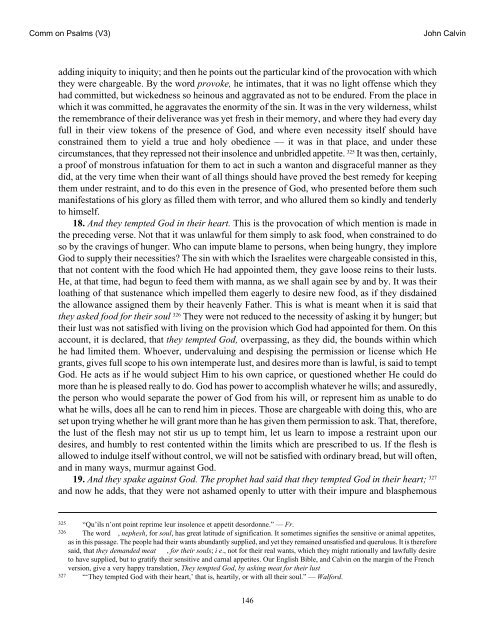Commentary on Psalms - Volume 3 - Bible Study Guides
Commentary on Psalms - Volume 3 - Bible Study Guides
Commentary on Psalms - Volume 3 - Bible Study Guides
- No tags were found...
Create successful ePaper yourself
Turn your PDF publications into a flip-book with our unique Google optimized e-Paper software.
Comm <strong>on</strong> <strong>Psalms</strong> (V3)John Calvinadding iniquity to iniquity; and then he points out the particular kind of the provocati<strong>on</strong> with whichthey were chargeable. By the word provoke, he intimates, that it was no light offense which theyhad committed, but wickedness so heinous and aggravated as not to be endured. From the place inwhich it was committed, he aggravates the enormity of the sin. It was in the very wilderness, whilstthe remembrance of their deliverance was yet fresh in their memory, and where they had every dayfull in their view tokens of the presence of God, and where even necessity itself should havec<strong>on</strong>strained them to yield a true and holy obedience — it was in that place, and under thesecircumstances, that they repressed not their insolence and unbridled appetite. 325 It was then, certainly,a proof of m<strong>on</strong>strous infatuati<strong>on</strong> for them to act in such a want<strong>on</strong> and disgraceful manner as theydid, at the very time when their want of all things should have proved the best remedy for keepingthem under restraint, and to do this even in the presence of God, who presented before them suchmanifestati<strong>on</strong>s of his glory as filled them with terror, and who allured them so kindly and tenderlyto himself.18. And they tempted God in their heart. This is the provocati<strong>on</strong> of which menti<strong>on</strong> is made inthe preceding verse. Not that it was unlawful for them simply to ask food, when c<strong>on</strong>strained to doso by the cravings of hunger. Who can impute blame to pers<strong>on</strong>s, when being hungry, they imploreGod to supply their necessities? The sin with which the Israelites were chargeable c<strong>on</strong>sisted in this,that not c<strong>on</strong>tent with the food which He had appointed them, they gave loose reins to their lusts.He, at that time, had begun to feed them with manna, as we shall again see by and by. It was theirloathing of that sustenance which impelled them eagerly to desire new food, as if they disdainedthe allowance assigned them by their heavenly Father. This is what is meant when it is said thatthey asked food for their soul 326 They were not reduced to the necessity of asking it by hunger; buttheir lust was not satisfied with living <strong>on</strong> the provisi<strong>on</strong> which God had appointed for them. On thisaccount, it is declared, that they tempted God, overpassing, as they did, the bounds within whichhe had limited them. Whoever, undervaluing and despising the permissi<strong>on</strong> or license which Hegrants, gives full scope to his own intemperate lust, and desires more than is lawful, is said to temptGod. He acts as if he would subject Him to his own caprice, or questi<strong>on</strong>ed whether He could domore than he is pleased really to do. God has power to accomplish whatever he wills; and assuredly,the pers<strong>on</strong> who would separate the power of God from his will, or represent him as unable to dowhat he wills, does all he can to rend him in pieces. Those are chargeable with doing this, who areset up<strong>on</strong> trying whether he will grant more than he has given them permissi<strong>on</strong> to ask. That, therefore,the lust of the flesh may not stir us up to tempt him, let us learn to impose a restraint up<strong>on</strong> ourdesires, and humbly to rest c<strong>on</strong>tented within the limits which are prescribed to us. If the flesh isallowed to indulge itself without c<strong>on</strong>trol, we will not be satisfied with ordinary bread, but will often,and in many ways, murmur against God.19. And they spake against God. The prophet had said that they tempted God in their heart; 327and now he adds, that they were not ashamed openly to utter with their impure and blasphemous325 “Qu’ils n’<strong>on</strong>t point reprime leur insolence et appetit desord<strong>on</strong>ne.” — Fr.326 The word , nephesh, for soul, has great latitude of significati<strong>on</strong>. It sometimes signifies the sensitive or animal appetites,as in this passage. The people had their wants abundantly supplied, and yet they remained unsatisfied and querulous. It is thereforesaid, that they demanded meat , for their souls; i e., not for their real wants, which they might rati<strong>on</strong>ally and lawfully desireto have supplied, but to gratify their sensitive and carnal appetites. Our English <strong>Bible</strong>, and Calvin <strong>on</strong> the margin of the Frenchversi<strong>on</strong>, give a very happy translati<strong>on</strong>, They tempted God, by asking meat for their lust327 “‘They tempted God with their heart,’ that is, heartily, or with all their soul.” — Walford.146
















